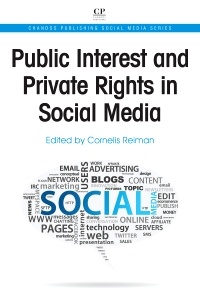Description
Public Interest and Private Rights in Social Media
Chandos Publishing Social Media Series
Coordinator: Reiman Cornelis
Language: English
Subjects for Public Interest and Private Rights in Social Media:
254 p. · 15.5x23.2 cm · Paperback
Description
/li>Contents
/li>Biography
/li>Comment
/li>
List of figures and tables
Acknowledgements
Preface
About the editor
About the contributors
Chapter 1: Social media growth and global change
Abstract:
Introduction
Some history
Social media and social activism
Social media at work
Social analytics
Legal implications of increasing social media usage
Conclusion
Chapter 2: Flash rob or protest movement: the First Amendment and regulating online calls to action
Abstract:
Flash mobs
The history of incitement cases in the United States
How lower courts have dealt with Brandenburg
Criminal law: crimes and speech
Difficulties for Brandenburg posed by new media
Other possible First Amendment protections
Conclusion
Chapter 3: World justice – the rule of law around the world
Abstract:
Legal implications of social media
The rule of law
Rankings of the rule of law by regions
Rule of Law Index and social media
Social media – chance or challenge?
Conclusion
Chapter 4: Default metaphysics – social networks and the self
Abstract:
Normalised differences
Submitting subjects
Being traded
Archiving the self
Attention as apparatus
Chapter 5: A service-oriented approach to public sector social media strategy
Abstract:
Introduction
What social media platforms or tools should our organisation be using?
What do we need to commit to, in terms of risk and resources?
Resources – knowing what it costs to get what you want
Research and monitoring
Posting and curating
Community management
Crowd-sourcing, contests, apps and other campaigns
Risk – understanding the tradeoffs of social media
How do we measure success?
Conclusion
Chapter 6: Social media in the humanitarian space
Abstract:
Introduction
Networking offline and online
Introduction to technology: the Hindenburg example
Using social media for social good: Born HIV Free campaign
Uses of social media in the humanitarian space: from conversation to action
Lessons learned: where are we going?
Chapter 7: Social media: the new tool in business education
Abstract:
Introduction
Social capital and social media
Social networks within business
Social media in the curriculum
Social media in business education
Social media and pedagogical issues
Conclusion
Chapter 8: Social media: does it generate the continuum of transparency in organisations?
Abstract:
Transparency: shifting lines in the sand
The positive and negative continuum of transparency
Transparency as control through social media
The role of civility and etiquette
Transparency tensions in the organisational social network: The next step
Chapter 9: Social media: blessing or curse? – a business perspective
Abstract:
Introduction
Social media as a marketing tool
Can social media generate new business?
Chapter 10: Improving the customer experience: how social media can make a difference
Abstract:
Introduction
Define what you want to do and why
Define, assess and create
Link key drivers to corporate strategy
Manage the process
Conclusion
Chapter 11: The uses and accuracy of social analytics data and platforms
Abstract:
Introduction
Social media data and various practices
Analytics measurement chasms
What works for social media and return on investment?
What works in social media for corporate stakeholders and social media return on investment?
Conclusion
Chapter 12: Altruism – a valuable dimension of the digital age
Abstract:
Introduction
Traditional networking behaviour
Collaboration and cooperation
Social media in the emerging digital economy
Building trust
Trust and collaboration
Exchanging value
Our copyright laws are a mess
What must change
I see the solution as an online automated system that:
Conclusion
Index
- Provides a guide to the key components of corporate and academic use of social media
- Offers technological and non-technological, legal, and international perspectives
- Considers socio-political impact and legal issues

